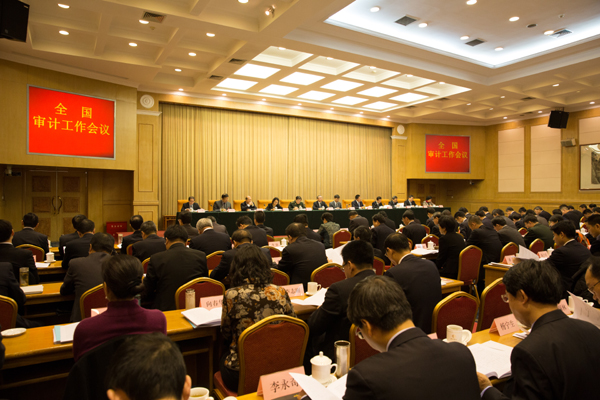
LIU Jiayi, Auditor General of CNAO

The Annual National Audit Conference was convened in Beijing from 28th to 29th December in Beijing, to sum up the audit work during the 12th Five-Year Plan period, deliberate audit development strategies during the upcoming 13th Five-Year Plan period, and plan for audit activities in 2016. The conference also commended the nationwide outstanding audit projects in 2015. Over 190 people attended the meeting, including representatives from local audit offices, CNAO headquarters, CNAO regional offices and offices located in the ministries, as well as guest auditors and special invitees. Liu Jiayi, Auditor General of China, addressed the conference.
Liu Jiayi indicated that government auditing in China enjoyed steady development during the 12th Five-Year Plan period under the leadership of the CCCPC and the State Council. Deeper understanding has been acquired on the nature and rules of government auditing, new achievements made in better serving the overall economy and society, new breakthroughs effected in audit methodologies, and new development attained in the audit legal framework. In addition, the competence and capacity of auditors have been upgraded, and China's government auditing has had a stronger profile in the international arena. All in all, all objectives and tasks of the 12th Five-Year Plan have been accomplished. During that period, nearly 700,000 entities have been audited, over 1.7 trillion yuan generated by increasing revenues and cutting expenditures or retrieving losses, more than 22,000 clues to major violations of discipline and law transferred, and 27,000 systems and procedures established or improved. Hence, audit supervision has played a significant role in maintaining the authority of the central leadership, facilitating effective implementation of decisions, furthering reform and scientific development, safeguarding national economic security and people's wellbeing, promoting democracy and rule of law, and combating corruption.
In 2015, audit offices nationwide focused on the implementation of major policy measures and performed their duties conscientiously. From January to November, nearly 100,000 entities were audited, over 380 billion yuan generated by increasing revenues and cutting expenditures or retrieving losses, 2,100 systems and procedures established or improved, and more than 3,600 clues to major violations of disciplines and laws transferred.
Liu Jiayi stressed that the key to fulfilling the mandate of audit supervision and giving better play to the audit function during the 13th Five-Year Plan period lies in innovation. Innovation is the main theme of auditing during the 13th Five-Year Plan period, a power source for performing duties, a guide in developing the audit cause and an effective weapon for tackling problems. Auditors should solve new problems with new ideas, new ways of thinking and new measures.
To serve as a cornerstone and important safeguard in national governance, the general requirements on auditing in 2016 are as follows:
l to focus tightly on the priorities set by the Central Economic Working Conference, implement the vision of innovative, coordinated, green, open and inclusive development, and reinforce reform and innovation;
l to further improve the audit system, carry out the audit mandate in all aspects, and set as top priority the implementation of major central decisions;
l to disclose and sanction major violations of discipline and law, reflect significant hidden risks, and reveal deep-rooted problems that hinder development; and
l to boost the quality and effectiveness of economic growth, promote supply-side structural reform, facilitate better macro-regulation and industrial restructuring, and improve people's wellbeing and the eco-system.
During auditing, auditors should uphold the principles of legality, innovation and facilitation of reform, and lay emphasis on effective policy implementation, efficient use of public funds, risk prevention, people's wellbeing, intensive and economic utilization of resources and energy as well as environmental protection, law-based administration, anti-corruption, and innovations in systems and mechanisms.
